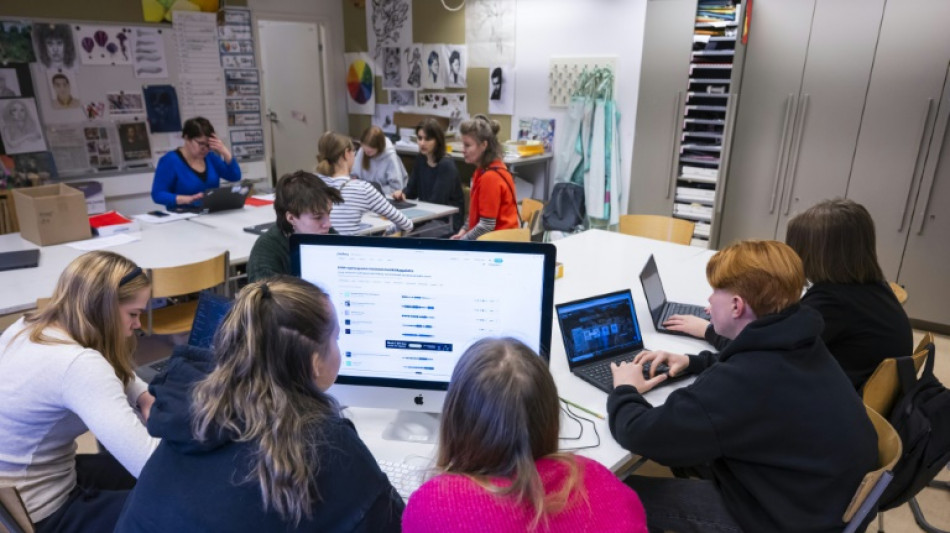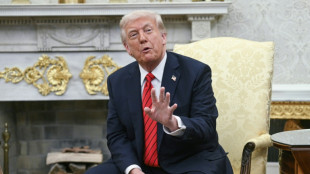
-
 Israel cancels visas for French lawmakers
Israel cancels visas for French lawmakers
-
Russia and Ukraine trade blame over Easter truce, as Trump predicts 'deal'

-
 Valverde stunner saves Real Madrid title hopes against Bilbao
Valverde stunner saves Real Madrid title hopes against Bilbao
-
Ligue 1 derby interrupted after assistant referee hit by projectile

-
 Leclerc bags Ferrari first podium of the year
Leclerc bags Ferrari first podium of the year
-
Afro-Brazilian carnival celebrates cultural kinship in Lagos

-
 Ligue 1 derby halted after assistant referee hit by projectile
Ligue 1 derby halted after assistant referee hit by projectile
-
Thunder rumble with record win over Memphis in playoff opener

-
 Leverkusen held at Pauli to put Bayern on cusp of title
Leverkusen held at Pauli to put Bayern on cusp of title
-
Israel says Gaza medics' killing a 'mistake,' to dismiss commander

-
 Piastri power rules in Saudi as Max pays the penalty
Piastri power rules in Saudi as Max pays the penalty
-
Leaders Inter level with Napoli after falling to late Orsolini stunner at Bologna

-
 David rediscovers teeth as Chevalier loses some in nervy Lille win
David rediscovers teeth as Chevalier loses some in nervy Lille win
-
Piastri wins Saudi Arabian Grand Prix, Verstappen second

-
 Kohli, Rohit star as Bengaluru and Mumbai win in IPL
Kohli, Rohit star as Bengaluru and Mumbai win in IPL
-
Guirassy helps Dortmund past Gladbach, putting top-four in sight

-
 Alexander-Arnold lauds 'special' Liverpool moments
Alexander-Arnold lauds 'special' Liverpool moments
-
Pina strikes twice as Barca rout Chelsea in Champions League semi

-
 Rohit, Suryakumar on song as Mumbai hammer Chennai in IPL
Rohit, Suryakumar on song as Mumbai hammer Chennai in IPL
-
Dortmund beat Gladbach to keep top-four hopes alive

-
 Leicester relegated from the Premier League as Liverpool close in on title
Leicester relegated from the Premier League as Liverpool close in on title
-
Alexander-Arnold fires Liverpool to brink of title, Leicester relegated

-
 Maresca leaves celebrations to players after Chelsea sink Fulham
Maresca leaves celebrations to players after Chelsea sink Fulham
-
Trump eyes gutting US diplomacy in Africa, cutting soft power: draft plan

-
 Turkey bans elective C-sections at private medical centres
Turkey bans elective C-sections at private medical centres
-
Lebanon army says 3 troops killed in munitions blast in south

-
 N.America moviegoers embrace 'Sinners' on Easter weekend
N.America moviegoers embrace 'Sinners' on Easter weekend
-
Man Utd 'lack a lot' admits Amorim after Wolves loss

-
 Arteta hopes Arsenal star Saka will be fit to face PSG
Arteta hopes Arsenal star Saka will be fit to face PSG
-
Ukrainian troops celebrate Easter as blasts punctuate Putin's truce

-
 Rune defeats Alcaraz to win Barcelona Open
Rune defeats Alcaraz to win Barcelona Open
-
Outsider Skjelmose in Amstel Gold heist ahead of Pogacar and Evenepoel

-
 Arsenal make Liverpool wait for title party, Chelsea beat Fulham
Arsenal make Liverpool wait for title party, Chelsea beat Fulham
-
Trump slams 'weak' judges as deportation row intensifies

-
 Arsenal stroll makes Liverpool wait for title as Ipswich face relegation
Arsenal stroll makes Liverpool wait for title as Ipswich face relegation
-
Sabalenka to face Ostapenko in Stuttgart final

-
 Kohli, Padikkal guide Bengaluru to revenge win over Punjab
Kohli, Padikkal guide Bengaluru to revenge win over Punjab
-
US aid cuts strain response to health crises worldwide: WHO

-
 Birthday boy Zverev roars back to form with Munich win
Birthday boy Zverev roars back to form with Munich win
-
Ostapenko eases past Alexandrova into Stuttgart final

-
 Zimbabwe on top in first Test after Bangladesh out for 191
Zimbabwe on top in first Test after Bangladesh out for 191
-
De Bruyne 'surprised' over Man City exit

-
 Frail Pope Francis takes to popemobile to greet Easter crowd
Frail Pope Francis takes to popemobile to greet Easter crowd
-
Lewandowski injury confirmed in blow to Barca quadruple bid

-
 Russia and Ukraine accuse each other of breaching Easter truce
Russia and Ukraine accuse each other of breaching Easter truce
-
Zimbabwe bowl Bangladesh out for 191 in first Test in Sylhet

-
 Ukrainians voice scepticism on Easter truce
Ukrainians voice scepticism on Easter truce
-
Pope wishes 'Happy Easter' to faithful in appearance at St Peter's Square

-
 Sri Lanka police probe photo of Buddha tooth relic
Sri Lanka police probe photo of Buddha tooth relic
-
Home hero Wu wows Shanghai crowds by charging to China Open win


How Finnish youth learn to spot disinformation
Finland is consistently ranked as Europe's most media literate country and the skills needed to spot online hoaxes are on the school curriculum, amidst a boom of mis- and disinformation campaigns.
"Who knew what a troll was before?" literature and Finnish language teacher Saara Varmola asked her 14 to 15 year-old students who all promptly raised their hands during a class at a Helsinki school in November.
"Who produced the material that you watch, what do you produce yourself and whether you have an ethical responsibility," Varmola tells AFP, as she lists the critical questions to ask when living in a global information environment increasingly characterised by misleading information.
By teaching its citizens how to critically engage with media content to debunk hoaxes, mis- and disinformation, as well as to produce content of their own, Finland wants to promote media literacy as a civic skill.
The Nordic country was among the first in Europe to outline a national policy for media literacy in 2013.
Updated in 2019, the national policy ensures media literacy is integrated in subjects throughout education from early childhood to upper secondary classes.
To enhance skills among adults and the elderly, libraries and NGO's are offering courses.
"Media literacy is essential to building societal resilience, and Finland realised this quite early on," Anders Adlercreutz, Minister of Education, told AFP.
"As traditional media is responsible for less and less of the information we receive, it's especially important to be able to critically evaluate what you read," he added.
- 'Not immune to influence' -
The index compares 41 countries' resilience to disinformation based on indicators such as quality of education, media freedom and trust in society.
Neighbours Denmark, Norway, Estonia and Sweden trailed Finland's top ranking last year.
A collaborative approach between many sectors help explain Finland's success in promoting media literacy among its 5.5 million residents, according to Adlercreutz.
"It's not just the school, it's the media, the newspapers, businesses, the libraries, museums. Everybody sort of takes part in this work," he said.
According to Leo Pekkala, Deputy Director of Finland's National Audiovisual Institute (KAVI) -- an institution mandated to implement the country's media literacy policy -- it also boils down to Finns' trust in its societal institutions.
"We Finns still have a very strong trust in the defence forces, the army, the police and the government. We trust our politicians and we also trust the media", he said.
Still, between sharing a 1,340 kilometre (830 miles) border with Russia and facing the rise of artificial intelligence, Finland is not immune to the influence of dis- and misinformation campaigns, Adlercreutz warned.
"I'm not so sure that we have yet been tested fully in this matter", he said.
- Critical thinking key -
In the snow-covered school in Helsinki, Varmola handed out assignments to her students with questions related to online disinformation: 'Can youtubers and streamers mislead?', 'Is sponsored content a way of influencing through information?'
"Yes, youtubers and streamers and people on social media can do it. In my opinion, it's something you come across", 8th grader Bruno Kerman said in a discussiong with some of his fellow students.
"Yes, and who is preventing them?" classmate Niilo Korkeaoja continued.
The students said the education system had equipped them with abilities to spot suspicious information online, critically analyse content and verify sources they encounter on social media networks such as TikTok, Snapchat and Instagram.
"School has taught me to interpret messages in the media, also those written between the lines," Ronja Turunen, another student, said.
The country has a long tradition of promoting media skills among its citizens -- when its free comprehensive school system was introduced in the 1970's, the first education curriculum already referenced mass media education.
While education has evolved and adapted to the changing media environment and the advent of digital technologies, the key objective of teaching critical thinking has persisted, Pekkala noted.
"Our overall objective is to promote the kind of skills that will enable people to think and act critically and be active members of a democratic society," he said.
A major challenge now is to keep all its citizens up to date with the rapid changes in the digital sphere, including for the country's growing elderly population who may never have learned how to detect fake news on the internet.
G.Schmid--VB


